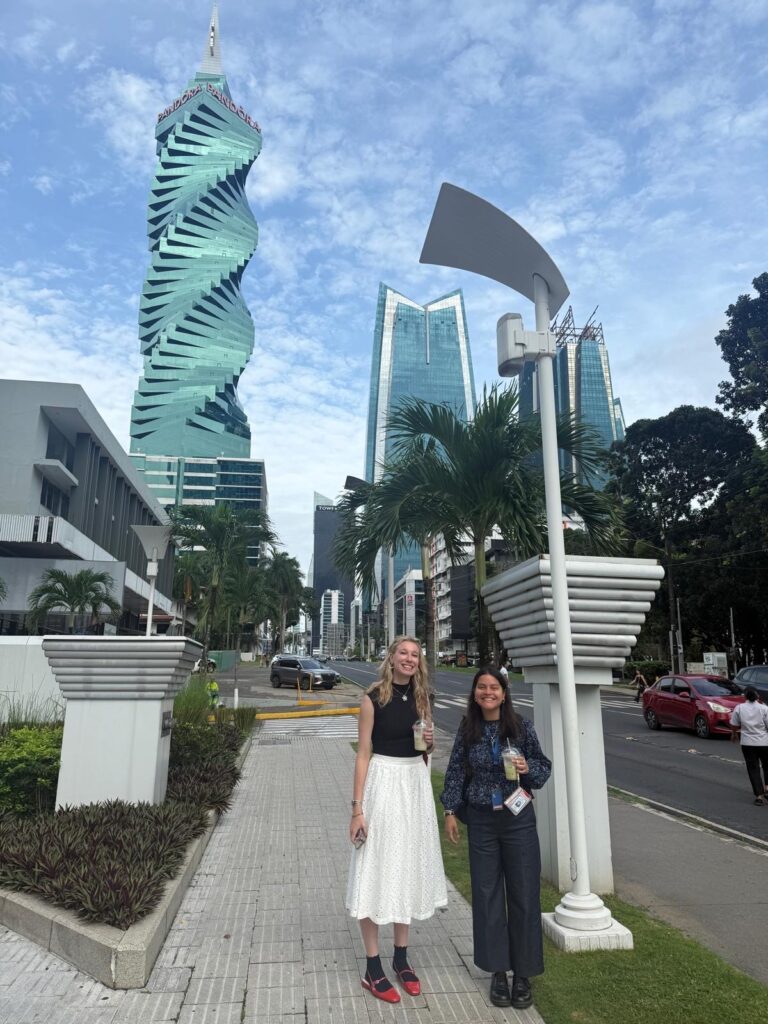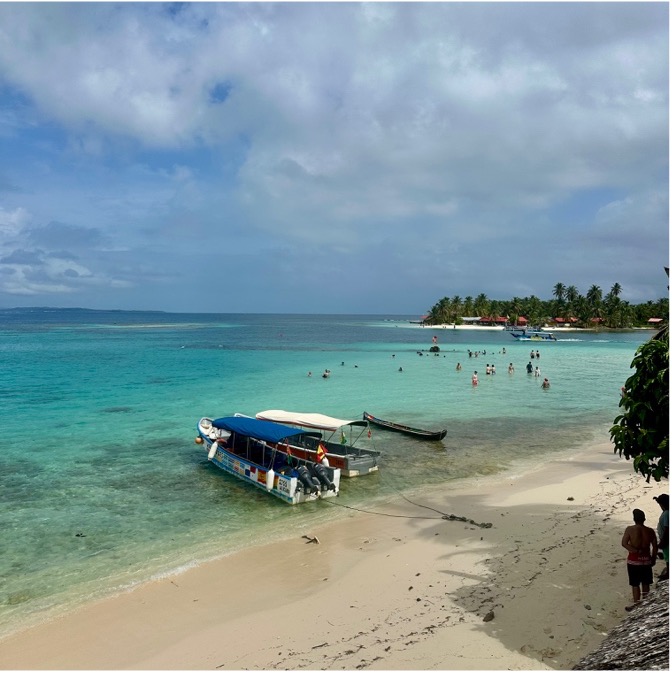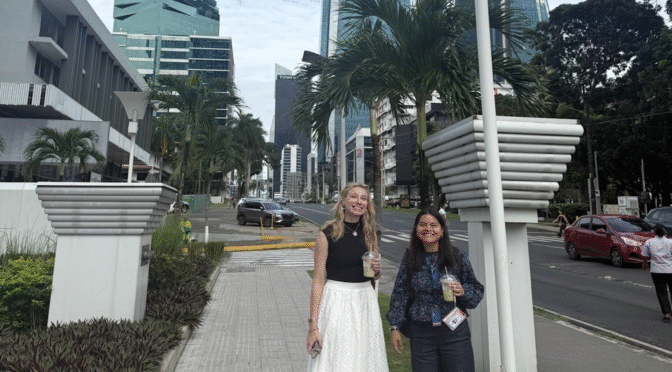By Allison Andrade, Undergraduate student in the UT International Relations and Global Studies Department and Plan II Honors Program
I had never considered visiting Panama, so when I excitedly told all of my friends and family that I would be spending the summer there, they were perplexed. The truth is that I had no idea what this experience would look like, but I knew that I was eager to explore and learn, and more than anything, I was passionate about being on a team focused on democratic development in Latin America. I can say now that my internship with International IDEA as part of the Embedded Scholars Program has been more than I imagined, and I am grateful for the opportunity to practice my Spanish professionally, work on fostering democracy, and learn about the diversity and history of Panama.
I have been located at International IDEA’s regional office in Panama, working under my mentor and Project Manager, Blanca Blanco Abellan, on the project, “Improving the Resilience of Democracy in Central America,” which focuses on supporting civil society organizations (CSOs) and media companies in Guatemala, Honduras, and El Salvador, also known as the Northern Triangle. This project aims to identify significant political, social, and economic barriers that these organizations face and utilize these findings to provide targeted workshops and technical assistance, thereby enhancing their resiliency and promoting civil discourse, political engagement, and minority representation within their respective countries.

In particular, this project means a lot to me because I am of Salvadoran heritage, and I am deeply interested in the politics and democracy of El Salvador. Even further, this project aligns with previous classwork I have done through my time at UT, providing me a unique opportunity to actively address issues I am passionate about and have studied, like democratic backsliding and decreasing civic engagement. It truly feels like a full-circle moment to work towards solutions for problems I have learned so much about!
During my first week, I became familiar with the structure of the project. International IDEA had put together a mapping of their analysis on each country’s political, economic, social, and legal situations, as well as surveyed several CSOs and media organizations to determine how these factors affect their work. With this information, my mentor developed and organized a series of workshops focused on the specific needs of the organizations. From there, International IDEA advertised this project, encouraging organizations to sign up for the workshops and, later on, receive specialized technical assistance based on their outstanding needs.
One of my assignments within the project was collecting resources for specific technical assistance by building a database that would be transformed into an accessible report for the organizations in need. We needed to create two separate reports—one for journalists and the media, and the other for CSOs—and find grant-funding, capacity-building programs, and tools that were relevant for them. I focused on identifying international organizations with ongoing projects in the Northern Triangle, and I collected relevant information to guide CSOs and the media on the process to receive those tools. I was also able to get in contact with many of the international organizations to introduce International IDEA’s project and the database, and request more information on their specific programs.
The databases continue to be an ongoing project that we hope to have finalized in a couple of weeks. My advisor and I have also been particularly busy with programming. The biggest—and most impactful—activity of the project is the tailored training which International IDEA will present to the CSOs and media organizations during a five-month period. So far, we have hosted the first meeting, which was the kick-off of the series of trainings. In a couple of weeks, we will start the first of seven developmental trainings focused on issues related to institutional strengthening and democracy-building.
Before the launch of these trainings, I was focused on assisting advertising and programming. I was able to meet partner organizations in Honduras and Guatemala who were in charge of recruitment and sit in on meetings to discuss the kick-off training. I was assigned to design and proctor a survey that will be used for all of the trainings, in order to track the organizations’ satisfaction with the trainings, where they need further support, and how to improve for future projects. In addition, I focused on creating infographics that would be shared online and with other organizations to promote our project, and I assisted in developing contracts to legitimize the participating organizations’ commitment to this project.
When we hosted the launch meeting, with a total of 40 participants, I found it incredibly gratifying to see the culmination of all of the preparatory meetings and tasks we had done, as well as to meet the CSOs and media organizations with diverse backgrounds and focuses who all chose to be a part of the training program, officially known as, “Allied for Democracy.” Now, in my final weeks as part of this team, I am helping to develop materials to present this project at an international conference and assisting in outstanding tasks for our next training.


Outside of my work at International IDEA, I have tried to maximize my weekends and afternoons to explore everything about Panama. From the kind Uber drivers who gave me insight into Panamanian culture to students from other parts of the world, like Canada, France, and Panamanian locals, who are here on their own programs, I have met so many people who have shown me that Panama is anything but a homogeneous culture. That is what makes it so unique.
With my Embedded Scholar friends, and also new friends I have made, I have done weekend excursions to all sides of Panama to explore its city life, best beaches, and the gastronomic culture—especially the cafés. Among my favorite trips have been a day trip to Portobelo, where we received a free lesson on scuba diving by a generous tour guide, a weekend in San Blas Islands, where we spent the night at Isla Perro Chico and went island hopping the following day, and all of our Fridays in Casco Viejo and the City of Knowledge, trying new coffee shops. (I highly recommend Gamboa Baking Company and Momo Coffee Shop.)
There is so much to do in Panama, and a lot of opportunities to learn about its rich biodiversity, its history, and its culture. I went to the MOLA Museum, the Museum of Panamanian History, and the Museum of the Canal to understand more about Panama’s indigenous communities and the country’s fight for independence. I took trips to Panama Viejo, completed a hike at the Metropolitan National Park, took a ferry to Taboga Island, and woke up early to complete a bike ride from the Amador Causeway to the end of the Cinta Costera and back.
My time is almost up in Panama, but there is still so much I wish I could do. Panama has a lot to offer, and my work at International IDEA has been so fulfilling and has given me the opportunity to grow professionally. I am thankful for everything this opportunity has given me!
